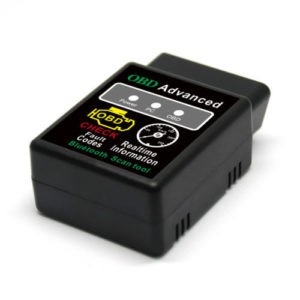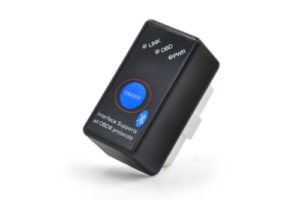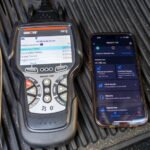For car enthusiasts and everyday vehicle owners alike, understanding your car’s health is becoming increasingly accessible thanks to advancements in automotive technology. Central to this is the Obd2 Adapter, a small but powerful tool that bridges the gap between your vehicle’s computer and diagnostic applications. If you’re looking to dive into the world of DIY car diagnostics with tools like Car Scanner, selecting the correct OBD2 adapter is your crucial first step.
This guide will delve into everything you need to know about OBD2 adapters, often referred to as ELM327 adapters due to the popular chip they utilize. We’ll explore the different types available, how to choose a quality adapter, and which models are recommended for reliable car diagnostics. Whether you’re an experienced mechanic or a car owner wanting to understand those dashboard lights, this guide will equip you with the knowledge to make an informed decision when purchasing an obd2 adapter.
Understanding ELM327 OBD2 Adapters
At its core, an OBD2 adapter, particularly those based on the ELM327 chip, acts as the communication interface for your car’s On-Board Diagnostics II (OBD2) system. This system is standard in most cars manufactured after 1996 and provides access to a wealth of data about your vehicle’s performance and health. The obd2 adapter plugs into your car’s OBD2 port, typically located under the dashboard, and wirelessly connects to your smartphone, tablet, or laptop, running diagnostic software like Car Scanner.
The importance of choosing the right obd2 adapter cannot be overstated. It directly impacts your ability to connect to your car’s systems and the reliability of the data you receive. A subpar adapter can lead to connection issues, inaccurate readings, or even potential damage to your vehicle’s electronic systems. Therefore, understanding the nuances of obd2 adapter selection is essential for effective car diagnostics.
Connection Types: Bluetooth, Wi-Fi, and More
When selecting an obd2 adapter, one of the primary considerations is the connection type. Adapters communicate wirelessly, and the technology they use dictates compatibility with your devices and the user experience. Here’s a breakdown of the common types:
-
Wi-Fi OBD2 Adapters: These adapters create a direct Wi-Fi network that your device connects to.
- Pros: Generally compatible with both iOS (Apple) and Android devices. Can sometimes offer slightly faster data transfer rates in certain scenarios.
- Cons: Connecting to a Wi-Fi obd2 adapter often means disconnecting from your regular Wi-Fi internet connection, which can be inconvenient for online features or real-time data lookup during diagnostics. Can sometimes be less stable than Bluetooth in crowded wireless environments.
-
Bluetooth Classic OBD2 Adapters (Versions 1.x, 2.x, 3.x): These are traditional Bluetooth adapters.
- Pros: Widely compatible with Android devices. Generally reliable and offer a good balance of speed and stability for diagnostic tasks. Often more affordable than other types.
- Cons: Crucially, these are NOT compatible with Apple iOS devices (iPhones, iPads) due to limitations in Apple’s operating system. If you are an iOS user, a classic Bluetooth obd2 adapter will not work with your device.
-
Bluetooth Low Energy (LE) OBD2 Adapters (Version 4.0 and above): Also known as Bluetooth 4.0 or Bluetooth Smart, these adapters use a more energy-efficient Bluetooth protocol.
- Pros: Compatible with both iOS and Android devices. Offer a good balance of speed and energy efficiency. Becoming increasingly popular and readily available. Often recommended for iOS users due to Bluetooth Classic incompatibility.
- Cons: Data transfer speeds might be slightly slower compared to Bluetooth Classic in some applications, although generally sufficient for car diagnostics.
-
Bluetooth MFi OBD2 Adapters: These are Classic Bluetooth adapters specifically certified by Apple for use with iOS devices.
- Pros: Guaranteed compatibility with iOS devices using Classic Bluetooth, which can offer faster data transfer than Bluetooth LE in some cases.
- Cons: These adapters are typically more expensive due to the Apple certification process. Relatively rare compared to Bluetooth LE and Wi-Fi options. Examples include OBDLink MX+ and vLinker FS. For Android devices, they function like regular Bluetooth Classic adapters.
-
USB OBD2 Adapters: These adapters connect via a USB cable.
- Pros: Wired connection can be very reliable and fast.
- Cons: Not supported by Car Scanner or many mobile-based diagnostic apps. Primarily used with laptop-based diagnostic software, limiting mobility and convenience for many users. Less practical for quick, on-the-go diagnostics.
Choosing the Right Connection for Your Device
The operating system of your smartphone or tablet is the deciding factor when choosing the connection type for your obd2 adapter:
-
Apple iOS (iPhone/iPad): Your options are Bluetooth LE (4.0), Wi-Fi, or Bluetooth MFi. Bluetooth LE is generally the most recommended for iOS users due to its balance of compatibility, ease of use, and availability. Wi-Fi can be an option, but the internet connectivity disruption is a significant drawback for many. Bluetooth MFi offers potentially higher performance but at a premium price. Avoid Classic Bluetooth adapters entirely if you are using an iPhone or iPad.
-
Google Android: Android devices offer greater flexibility, supporting Classic Bluetooth, Bluetooth LE, and Wi-Fi OBD2 adapters. Classic Bluetooth is often recommended for Android due to its speed and reliability. However, Bluetooth LE and Wi-Fi are also viable options. Consider Bluetooth LE if you prioritize battery efficiency or want cross-compatibility if you also use iOS devices.
 bad elm1-1
bad elm1-1
Image of a generic, low-quality OBD2 adapter often sold online.
Quality Matters: Beyond ELM327 Versions
In the realm of obd2 adapters, focusing solely on “ELM327 version numbers” or internal components is often misleading. Marketing around “version 2.1” or specific chips has become outdated and unreliable. Counterfeiters and manufacturers of low-quality adapters have become adept at mimicking these specifications. Therefore, judging an obd2 adapter by these superficial details is no longer a reliable indicator of quality.
Instead, the crucial distinction lies between “good” and “bad” obd2 adapters based on their performance and reliability in real-world use. A “good” obd2 adapter simply works as expected: it establishes a stable connection, accurately transmits data, and reliably performs diagnostic commands. Your primary goal is to identify and purchase a “good” obd2 adapter to ensure a positive diagnostic experience.
The Pitfalls of “Bad” OBD2 Adapters
“Bad” or low-quality obd2 adapters are unfortunately prevalent in the market and can manifest a range of issues, severely hindering or completely negating their diagnostic capabilities. These problems include:
-
Complete Non-Functionality: The adapter may simply fail to power on or establish any connection with your car or device.
-
Unstable and Erratic Operation: The adapter might connect intermittently, freeze during operation, spontaneously reboot, or only function under specific environmental conditions (temperature, humidity). This inconsistency makes reliable diagnostics impossible. An adapter might work one day and fail the next without explanation.
-
Incomplete Command Support: Substandard adapters may claim to support the full range of ELM327 commands but only implement a subset. This limitation restricts the diagnostic functions you can perform, potentially missing crucial data or tests.
-
Fixed ECU Address Issues: Some faulty adapters are hard-coded to communicate only with a standard Engine Control Unit (ECU) address. This prevents communication with other ECUs in your car, such as those controlling the transmission, ABS, or airbags, severely limiting diagnostic scope.
-
Data Length Restrictions: Poorly designed adapters might have limitations on the length of data requests and responses, truncating important information and leading to incomplete or inaccurate diagnostic readings.
-
Data Loss and Corruption: Unreliable adapters can lose data packets during transmission or reception. Imagine the ECU sending five data packets, but the adapter only captures the 1st, 2nd, and 5th. This fragmented data is unusable for accurate diagnostics. Data corruption, where the adapter alters the data during transmission, is another serious concern.
-
Protocol Incompatibility: While claiming to support multiple OBD2 protocols, a bad adapter might only support a limited number. If your car uses an unsupported protocol, the adapter will fail to communicate, even if it works perfectly fine with other vehicles using different protocols.
-
On-Board Network Interference: Critically, some low-quality obd2 adapters can inject “noise” or junk data into your car’s on-board network. This interference can disrupt the normal functioning of your car’s ECUs, potentially causing engine roughness or other performance issues while the adapter is plugged in.
-
Coding and Service Mode Unreliability: If you intend to use your obd2 adapter for advanced functions like ECU coding or service procedures (resetting service lights, etc.), a high-quality adapter is paramount. Data writing to the ECU is a critical operation, and a bad adapter can lead to data corruption, failed procedures, or, in the worst-case scenario, damage to your car’s control units.
The Overabundance of Bad Adapters: The most significant challenge is the sheer number of substandard obd2 adapters flooding the market. The probability of purchasing a faulty adapter is unfortunately high, making careful selection and informed purchasing decisions essential.
 badelm3
badelm3
More examples of generic, potentially unreliable OBD2 adapters to be wary of.
Recommended OBD2 Adapters for Reliable Diagnostics
To help you navigate the crowded obd2 adapter market, here are some recommended models known for their quality and reliability, categorized roughly from most expensive to more budget-friendly options. These recommendations are based on expert reviews and user feedback within the Car Scanner community.
Top-Tier Performance (Premium Options):
-
OBDLink MX+ with Bluetooth MFi (#ad link): The premium choice, compatible with both iOS and Android via Bluetooth MFi and Bluetooth LE. Offers exceptional speed, a large memory buffer, and robust performance. Ideal for users who demand the best and need reliable iOS compatibility.
-
OBDLink CX with Bluetooth LE (#ad link): Another excellent OBDLink offering with Bluetooth LE, compatible with iOS and Android. Features a large memory buffer and outstanding performance, making it a top choice for demanding diagnostic tasks.
Highly Recommended Mid-Range Options:
-
vLinker Devices: vLinker has emerged as a reputable brand offering several excellent obd2 adapter options:
- vLinker MC+ with Bluetooth LE (#ad link): Bluetooth LE, excellent for iOS and Android.
- vLinker FS with Bluetooth MFi (#ad link): Bluetooth MFi for optimal iOS Classic Bluetooth performance.
- vLinker MS with Bluetooth MFi: Designed as a competitor to OBDLink, offering Bluetooth MFi for iOS. Later firmware updates have significantly improved the reliability of vLinker adapters, making them a strong contender. Firmware updates are available from the manufacturer’s website and are recommended to ensure optimal performance. Generally, MC, MC+, FS, or MS models are recommended for iOS, while any vLinker adapter is a solid choice for Android.
-
Vgate iCar Pro 2S: A newer model succeeding the iCar Pro BLE, offering improved performance and reliability. A good upgrade if you were considering the older iCar Pro.
-
Vgate iCar Pro BLE (#ad link): Features both Bluetooth 2.0 and Bluetooth 4.0, providing broad compatibility with iOS, Android, and Windows. Important: Ensure your iCar Pro BLE has firmware version 4.1.02 (or later, from 2021/01/08) to correctly support CAN Extended addressing, essential for diagnosing Toyota and BMW vehicles. Firmware updates can be downloaded from the manufacturer’s website.
Adapters to Avoid: Red Flags for Low Quality
To further assist in your selection process, here is a list of obd2 adapter types and brands to generally avoid due to reported issues with quality and reliability:
-
xTool Adapters: These are proprietary and not compatible with the ELM327 standard. They are designed to work exclusively with xTool’s own software, limiting their versatility.
-
Wired (USB, COM Port) Adapters: Car Scanner and many modern diagnostic apps do not support wired adapters. Focus on wireless Bluetooth or Wi-Fi options for compatibility with these applications.
-
“Mini” Adapters: Adapters marketed with “mini” in their name have an overwhelmingly high probability (99%) of being low-quality. This “mini” designation is often associated with cheaply made, unreliable adapters.
-
Extremely Cheap Adapters: Be wary of exceptionally low-priced obd2 adapters. While budget-friendly options exist, extremely cheap adapters often cut corners on component quality and manufacturing, leading to the issues described earlier.
-
Adapters with Specific Bluetooth MAC Addresses: Avoid adapters with Bluetooth MAC addresses starting with 11:22:33 or 00:00:00. These MAC addresses are frequently found on generic, low-quality clones.
-
KONNWEI Devices (Recent Production): While KONNWEI adapters were previously sometimes recommended, their quality has reportedly declined. Recent KONNWEI adapters are prone to data packet loss and are no longer recommended.
-
“Micro Mechanic” Adapters: Many adapters branded “Micro Mechanic” have a high failure rate, often ceasing to function after a short period of use.
-
“THINMI.COM” Adapters: These adapters typically offer limited support for ELM327 commands and are known to generate many fake responses, making them unsuitable for reliable diagnostics.
-
“KUULAA” Brand Adapters: KUULAA brand obd2 adapters are generally not recommended due to quality concerns.
-
Adapters with a Specific Generic Design: Avoid adapters that look like these common, generic designs (pictured below). While design alone doesn’t guarantee poor quality, these particular designs are very frequently associated with low-quality components and unreliable performance.
 badelm5
badelm5
More examples of generic OBD2 adapter designs that are often associated with poor quality.
Conclusion: Invest in Quality for Reliable Car Diagnostics
Choosing the right obd2 adapter is a critical investment for anyone serious about car diagnostics. While the market is saturated with options, prioritizing quality over price is paramount. By understanding the different connection types, being aware of the pitfalls of low-quality adapters, and focusing on recommended brands and models, you can ensure a reliable and effective car diagnostic experience. Investing in a quality obd2 adapter will save you frustration, time, and potentially prevent misdiagnoses or damage to your vehicle’s systems. Happy diagnosing!
Disclaimer: As an Amazon Associate, I earn from qualifying purchases through the ad links provided in this article.
